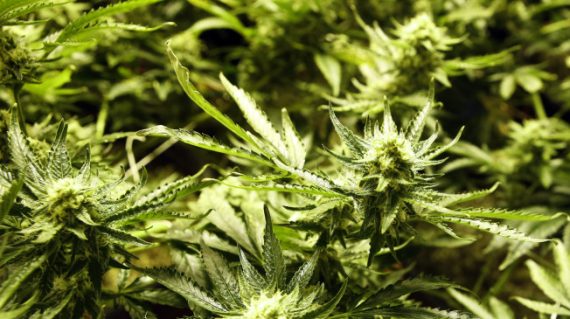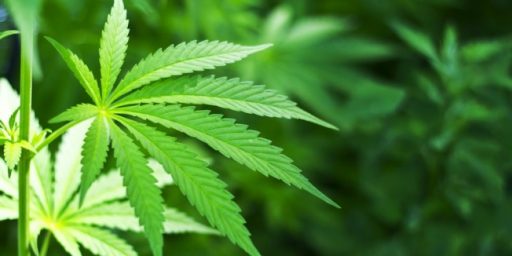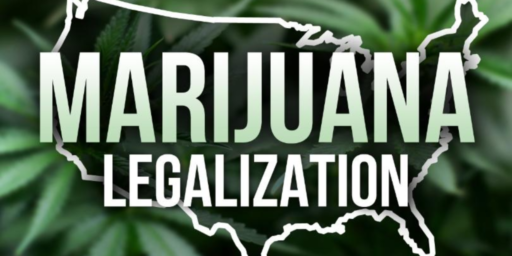New Poll Shows Support For Marijuana Legalization Continues To Rise
Public support for marijuana legalization continues to rise. As with the marriage equality movement, it's obvious where this will end, The only question is how long it will take to get there.
A new poll shows that public support for marijuana legalization continues to grow, boding well for efforts of those in states such as California trying to copy the legalization efforts of other states:
PRINCETON, N.J. — A majority of Americans continue to say marijuana use should be legal in the United States, with 58% holding that view, tying the high point in Gallup’s 46-year trend.
Americans’ support for legal marijuana has steadily grown over time. When Gallup first asked the question, in 1969, 12% of Americans thought marijuana use should be legal, with little change in two early 1970s polls. By the late 1970s, support had increased to about 25%, and held there through the mid-1990s. The percentage of Americans who favored making use of the drug legal exceeded 30% by 2000 and was higher than 40% by 2009.
Over the past six years, support has vacillated a bit, but averaged 48% from 2010 through 2012 and has averaged above the majority level, 56%, since 2013.
The higher level of support comes as many states and localities are changing, or considering changing, their laws on marijuana. So far, four states and the District of Columbia have made recreational use of marijuana legal, and Ohio voters are set to decide a ballot initiative that would do the same this coming Election Day. The topic has been an issue on the 2016 presidential campaign trail, and several candidates have expressed a willingness to let states set their own marijuana laws even though federal law prohibits marijuana use.
Not surprisingly, support is strongest among younger Americans, but there’s really only one age bracket left where legalization remains unpopular:
Gallup has previously reported that two of the biggest differentiators of Americans’ opinions on legal marijuana are age and party identification. Younger Americans, Democrats and independents are the most likely of major demographic and political groups to favor legalizing use of the drug, while Republicans and older Americans are least likely to do so.
Younger Americans have always shown the most support of any age group for making marijuana legal, but this has grown from 20% of 18- to 34-year-olds in 1969 to 71% of those in the same age group today. But even older age groups today are more likely to favor legal marijuana than the comparable age groups in the past. For example, 35% of senior citizens today (aged 65 and older) are in favor of legalization, compared with 4% of senior citizens in 1969. Among all age groups, the increase in support has been proportionately greater over the last 15 years than it was between any of the earlier time periods.
These patterns by age indicate that one reason Americans are more likely to support legal marijuana today than they were in the past is because newer generations of adults, who are much more inclined to favor use of the drug, are replacing older generations in the population who were much less inclined to want it to be legalized.
But the increase in support nationwide is also a function of attitude change within generations of Americans over the course of their adult lifespans. Gallup’s historical data allow for a look at how views on marijuana legalization have changed over time among independent samples of those in the same birth cohorts. For example, Americans who are aged 65 through 79 today — born between 1936 and 1950 — are more supportive of making marijuana legal in 2015 than those born in the same years were 15, 30 and 46 years ago. This birth cohort’s support has increased from 20% in 1969 to 29% in 2000/2001, and is 40% today.
In many ways, the rising public support for marijuana legalization mirrors the evolution we saw in polling on the issue of same-sex marriage and general acceptance of same-sex relationships. In both cases, we have seen a sharp increase in support of the idea of greater personal freedom over the relatively short period of time that has elapsed since the mid-1990s, and there’s every indication that this support will continue to increase as time goes on. To a large degree, of course, this is a reflection of broader changes in public mores and attitudes toward the acceptability of marijuana use. Fifty years ago, smoking marijuana was seen by most of society as something confined to a criminal, fringe element of society and the belief that use of marijuana would have the same kind of negative consequences as the use of harder drug use was widespread thanks to films such as Reefer Madness that presented a ridiculously exaggerated look at the impact of marijuana use. Those attitudes began to change significantly during the 1960s, of course, and marijuana use became quite common among anti-war protesters and other parts of the counter-cultural movement that helped define that decade. As those Baby Boomers have gotten older, their attitudes have become more widespread, and the old propaganda about the evils of marijuana have been thoroughly discredited. Additionally, several decades of the War On Drugs has seen people sent away to jail, or even Federal Prison, merely for possession of marijuana while the gangs that have cornered the market in distributing pot have grown in power and turned many inner cities into war zones. Thanks to this combination of social change and the evidence of the futility of the way we’ve approached this issue from a law enforcement perspective, public attitudes have shifted significantly to the point where four states and the District of Columbia have legalized marijuana, several jurisdictions have decriminalized it to the point that possession is no longer a criminal offense per se, and many more states have taken steps to make marijuana legal for medicinal purposes.
Politically, there are many signs that legalization is an idea that is likely to spread, although perhaps not as quickly as the legalization of same-sex marriage did in the years leading up to Obergefell v. Hodges. This year, for example, Ohio voters are being asked to vote on Issue 3, which would legalize marijuana, and while polling seems to show that the public is divided, advocates for the measure seem confident. Efforts to get similar measures on the ballot in states that include California, where Lt. Governor Gavin Newsom has predicted such a measure would pass, Missouri, Maine, Massachusetts, Hawaii, and Nevada. It’s unclear if initiatives will get on the ballot in all these states, and we may see others act as well, but it’s clear where the momentum on this issue is headed. Also, as I noted yesterday, the newly elected Liberal Party government in Canada is committed to legalizing marijuana in America’s closest neighbor. It may take time, but the direction of public opinion on this issue is clear, and the law will eventually catch up with it.






I think if Ohio legalizes it, that’s the ballgame. Not immediately, but there will be no turning back.
Kentucky is, IIRC, the 4th largest producer of marijuana in the U.S. Having one of their neighbors to the north collecting tax revenue, and enticing their black market growers to the legal lands* of Ohio? Only a matter of time until Kentucky follows suit. Tennessee–no slouches themselves in marijuana production–would follow a bit after that.
And once residents of Pittsburgh, Detroit, Fort Wayne, Indianapolis, and Charleston, WV are less than 60 minutes from legal weed, there will be a lot of pressure to legalize/decriminalize in those states.
And once you’ve lost the midwest, it’s no longer about those East Coast/West Coast/Boulder hippies. It’s Real Americans (TM) enjoying the devil weed.
So, good luck, Buckeyes. We’re all counting on you.
*I know there are restrictions on who can grow. I’m betting those restrictions will be temporary.
I guess as I near my 70th birthday I qualify as an older American. I smoked hashish when I worked for the DIA in Europe – they didn’t care because at least I didn’t come to work in the morning with a hangover and could do my job. Upon my return to the US I continued to smoke marijuana until drug tests became a condition of employment. THC continues to hang around in your body for days after your last high whereas alcohol is gone within 8 to 12 hours. Reefer Madness was largely financed by the alcohol industry who didn’t want any completion, Today much of the resistance is from the the pharmaceutical industry for the same reason.
HUH…WHA….IT’S 4:20 ALREADY????
Looks like the hippies are winning!
It’s like the 1960s all over again, except the revolution is being led not by long haired youngsters in sandals, but by their grown up versions with business suits and retirement plans!
Expected. This is precisely what the Drug Warriors feared. We’ve slowly been creeping along, legalizing it for medical use and now for recreational use. And the world hasn’t ended. And people start saying, “Well,OK then. Seems reasonable.”
Also driving attitude change, I think, is years of quai-legalization in the MMJ arena, as well as over a year of experimentation in “lab states” like CO and WA. There has been no explosion in traffic accidents caused by intoxicated driving. No great increase in crime, absenteeism at work, or strain on the medical establishment.
Once the specter of “reefer madness” is exposed to sunlight, it’s amazing how quickly it evaporates.
Instead we have industry, not just for the growers and sellers, but for their landlords, contractors, and suppliers as well. We have tax revenue. We have regulatory oversight. We also have, and this is no small thing, satisfied customers.
What is the point of life if it’s not to make a living and be happy?
@Neil Hudelson:
And if Canada legalizes marijuana, residents of Detroit will be about 60 seconds from legal weed.
That reminds me.
Any jurisdiction hoping to legalize marijuana and capitalize on pot tourism needs to also include provisions that allow for places to smoke it. “Smoke it at home” policies are great for residents, but if you don’t want your tourists toking up in the bushes or in the alley, you’ve got to give them a place to go. (Their non-smoking hotel doesn’t count.)
@James Pearce: Good point. Also, how long do you think the city of Detroit is going to want to watch all that potential tax revenue going into Windsor’s coffers?
@Mikey:
Colorado is probably going to end up collecting about $60-70 million in weed taxes. It’s less than some expected, but that’s $60-70 million not coming from parking tickets, bogus fines and fees, or other tax sources. (Of course, in CO, this level of tax collection has TABOR* implications.)
If states had access to this revenue, with no TABOR restrictions, it would make it easier to invest in their own infrastructure. Detroit would benefit from that, I think.
(* TABOR = Taxpayers Bill of Rights)
Well, I’m sending this message to my Rastafarian cousins in Jamaica: “I think we’re going to need a bigger field.” :-).
Interestingly, Doug views the rising poll numbers in favor of marijuana legalization as evidence that marijuana legalization is around the corner. Rising poll numbers in favor of gun safety legislation? That’s totally different, and gun safety advocates should just give up on the dreams of such legislation passing for foreseeable future. Funny, that…
@stonetools:
Well…in Doug’s defense…there is no analogous lobbying organization against pot like the gun lobby is against common sense. So while the old white guys in the Republican caucus may be against pot…there is nobody standing there and lining their pockets and telling them to fight it. So they probably won’t. Not very hard anyway.
@C. Clavin: The side against legal marijuana doesn’t need a lobbying organization, it already has a massive three-letter government agency dedicated to keeping the stuff illegal.
@Mikey :
Dude, they wish! If a border crossing was ever that fast, it’s either the ass-end of dawn on a Wednesday or something bad went down like the Zombie Apocalypse and everybody already left. The fastest border crossing post 9/11 I’ve ever had coming into the States for maybe 10 minutes with 2 cars ahead. Forgot about walking across the bridges either to save time…..
It might be faster to take the land route to Ohio most days….